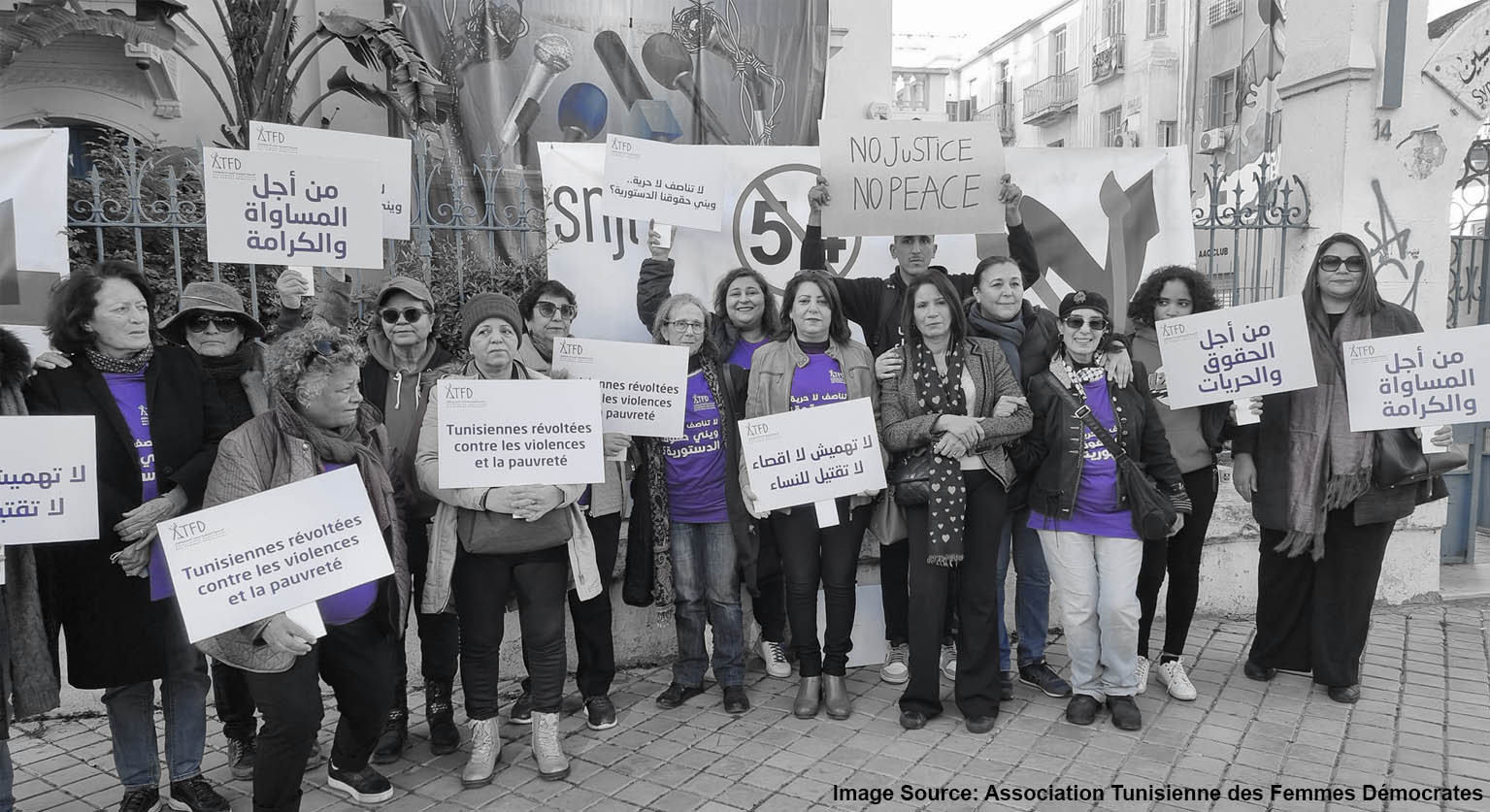

Feminism Between Solidarity and Participation - Dr. Azza Hajj Suleiman
The genocidal war against Gaza took center stage in the discourse of struggle in the Arab countries and around the world. It weighed heavily on the feminist movement in the face of all sorts of injustices, particularly that befalling Palestinian women due to colonialism, occupation, and consecutive wars.
The encounter produced a moment of awareness among feminists on the prevailing pattern of struggle since the Beijing Agreement and the programs promoted among the peoples of Third World countries after the announcement of the sustainable development plan. It is a free struggle contributing to an intertwined renaissance between Western and local feminist movements.
The war revealed that international laws and their implementation mechanisms, supposedly established to protect women, have turned against them. Many international laws and equality standards were used as an element of the conflict. They were activated in the interest of the countries that established them and their partners instead of people's interests. Arab women activists' appeals against the double standards in applying international law during the genocide have shown how laws are used against the Palestinian people's desired rights. This pivotal historical stage also showed the essential role of Palestinian women in confronting the occupation, genocide, and attempts to erase identity through their reproductive and nurturing roles. Women giving birth symbolized the insistence on continuing to exist on this land. Their caregiving roles in the family, health centers, and educational institutions were a continuation of the mechanism utilized in the previous century to survive and preserve their identity, despite all the attempts to erase it from international programs and those of the local authority. Religious culture stood out in allowing them the ability to withstand the century-old Zionist war machine. The above comes at a time of global and international transformations in society's management, development, and governance tools as a "novel" model for globalized democracy, based largely on the rule of law.
Understanding the dilemma entails looking at feminist action's legal dimension in the context of international political transformations.
In the 1968 revolution, the feminist movement achieved individual rights regarding women's bodies. A split ensued between feminists who saw these rights as mere individual feminist rights, on the one hand, and those who insisted on linking them to the socioeconomic struggle associated with the labor movement. However, these differences did not preclude feminists from significant achievements in citizenship, benefiting from entitlements guaranteed by the welfare state.
With the fall of the communist regime, the world entered a phase of globalization and neoliberalism, which entailed more individual commercial freedoms and weakened collective struggle. At the same time, feminist mobilization adopted a productive role characterized by women's care role rather than reproduction. Thus, it accepted the entry of women as a component of the market.
This phase posed an additional challenge to the feminist movement; global efforts combined to search for a unifying issue for the various feminist currents. CEDAW became a pillar for determining a unified direction by setting comprehensive standards to confront injustice and oppression. Unfortunately, Arab feminism engaged in this discourse without criticism or deconstruction. It used literature linked to standards from the "Western civilizational" model. The discourse was generalized in a comprehensive manner that does not approach the challenges of people subject to occupation and seeking liberation, except from the perspective of rejecting traditional social and religious norms based on their sexist nature.
The flaw relies on the following observations:
●
By its nature, neoliberalism is
built on maximizing freedoms, commercial freedoms in particular and opposing
local legal controls of a protective nature. Laws lost their deterrent force
due to the culture of increasing freedoms. Social
protection became part of the so-called "soft"[1] rules to achieve
sustainable development. These rules are rooted in recommendations toward
adopting subjective moral decisions or agreed-upon regulations that assume a
balance between the agreeing parties, the starting point that marginalized
groups lack.
●
The struggle was directed towards
opposing the injustice of state authorities, especially those not deemed
democratic. The women's movement benefited from the frameworks of individual
freedom and made singular achievements. However, as a weak social group, women
lost the guarantees that were part of the so-called social public order. A rift
arose between women who benefited from individual freedoms on the one hand and
those who lived a marginalized reality and found protection in religion as a
source of moral principles on the other. Divisions and conflicts arose between
the rights of different categories of women and between women's rights and
local laws.
●
Feminist mobilization called for
institutionalizing feminist work and feminizing legal texts despite the absence
of genuine protection in a changing economic and social reality. As gender
issues expanded, the division between social classes increased, and statutory
laws inscribed in texts started facing criticism globally, which weakened the
expected effectiveness of formal rules.
●
Feminists adopted the concept of
governance, the modern form of democracy derived from systems to manage major
economic endeavors. With the adoption of participatory governance, women became
stakeholders, which is a contemporary political role. Demands shifted from
equality in rights and duties to a numerical quota in digital governance
indicators. The feminist movement's achievements became linked to the numerical
division of positions, whose basis does not necessarily serve the goals of the
local feminist struggles. This approach and this reality have been linked to
what is known as economic feasibility without social feasibility. Law
transformed from a social protector to an element of production within the
theory of the economy of law.
●
In the era of globalization and
neoliberalism, the rulers are no longer limited to local state authorities.
Instead, they are part of an international system of governance in which the
interests of global political decision-making are intertwined with global
economic interests and are necessarily reflected in local political and
personal interests. For example, funding for local civil society organizations
comes from two sources: the parties promoting international programs under the
development slogan or global economic interests under the social responsibility
banner. They exert collective control over the performance of feminist
mobilization, its programs, and the conditions for funding Arab civil society
action.
● Feminist organizations adopted the programs proposed in donor agendas supporting the "democratic" movement. They promoted these concepts in their public discourse as a model for freedom and democracy without realizing that the globalized financial and international authorities are also fierce in their sexism. When Arab feminists raised their voices against the crimes committed against civilians in the Gaza Strip as part of their struggle to combat injustice, these sources threatened to withhold funding from activists, continuing the pattern of conditions imposed in their programs. Feminists did not see these organizations as sexist authorities until their performance was paralyzed and freedoms denied in the face of a multi-dimensional and multi-party crisis.
Between numbers and laws, the struggle between conflicting rights, the limits and freedoms of interests, and the need for protection while rejecting its tools, feminists fell into the trap of market neoliberalism and lost sight of the social struggle.
As the world watched, the genocide revealed the discrepancy between what formal and economic global organizations say and what they believe. The war proves that contemporary legal and institutional mechanisms, as foundations for democracy, are mere tools to establish neoliberalism and impose the principles of freedom without liberation. Awareness programs promoted individual freedoms according to the Western liberal model, pretending they were legitimate rights under unjust laws. Activists accepted the formality of representation at the expense of its effectiveness.
Feminists fell into the same dilemma as the literature when international organizations adopted Israel's "legitimate right" to defend itself regardless of the law. These organizations relied on the formality of representative participation of Arab women's interests in international resolutions, which is the model that feminists adopted in their choices and struggles.
The cards were mixed between the traditional divisions in feminist movements, which faced a decisive criterion for a struggle that imposed one of two options: colonialism or liberation.
The steadfastness of Palestinian women and their sustained role for nearly a century under military, cultural, and political oppression and legal neglect has provided a model for feminist liberation work. It has become imperative for feminists to set the compass of their struggles and the criteria of their partnerships between solidarity towards liberation or participation towards more consumption.
Recent publications

